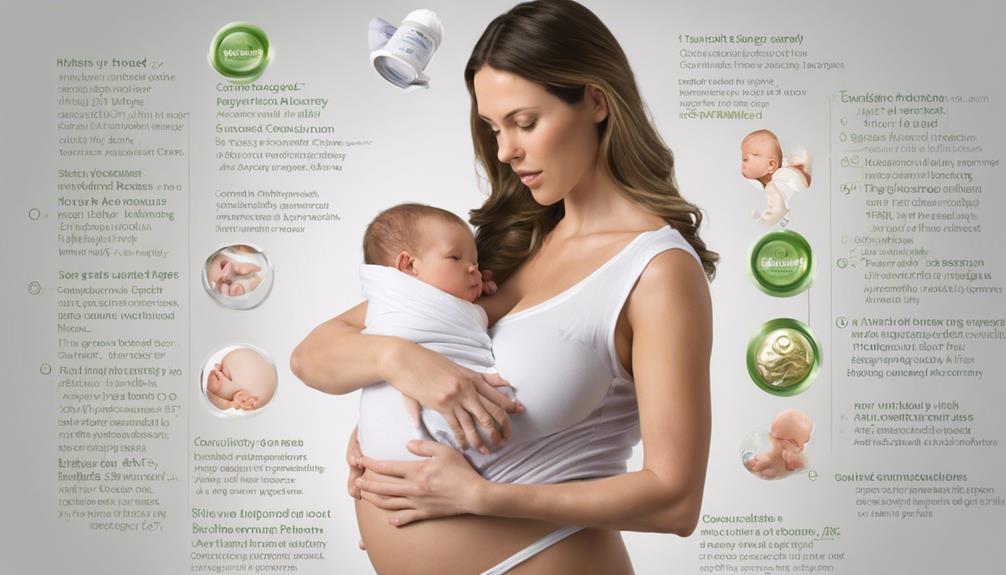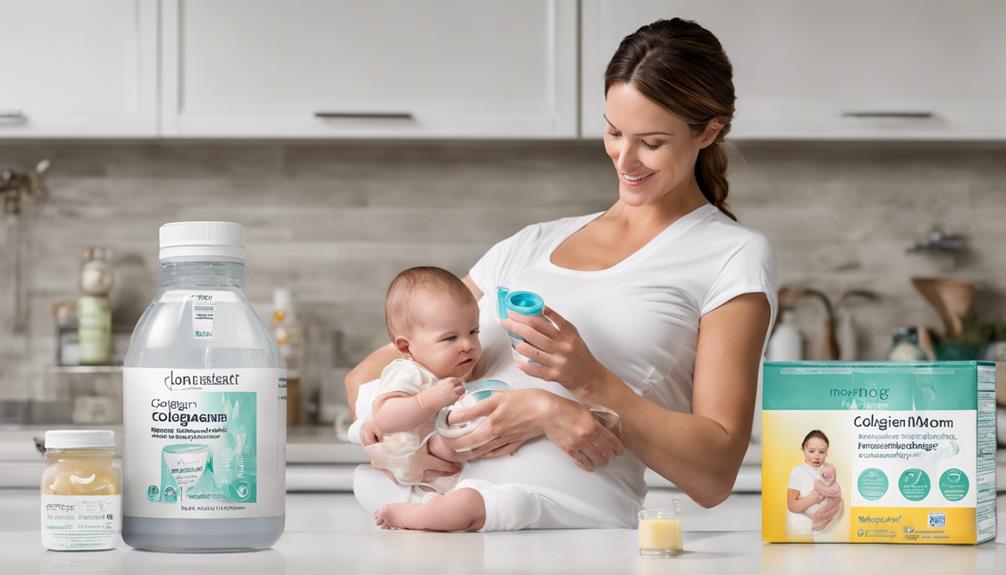As we delve into the world of postpartum wellness, the question of whether or not to incorporate collagen into our routine while breastfeeding continues to be a point of debate.
Ensuring the safety of both mother and baby is paramount, prompting the need for guidance on the appropriate way to include collagen supplements in our diet during this delicate phase.
Let's explore the considerations, precautions, and benefits that come with safely integrating collagen into our breastfeeding journey, shedding light on the best practices for nourishing ourselves and our little ones.
Key Takeaways
- Consult a healthcare provider before starting collagen supplements while breastfeeding.
- Choose high-quality, non-GMO collagen products to ensure safety.
- Incorporate collagen-rich foods like bone broth and fish for natural benefits.
- Start with a low collagen dosage and adjust gradually under professional guidance.
Benefits of Collagen for Breastfeeding Moms
In supporting postpartum recovery, collagen offers breastfeeding mothers essential benefits for healing and regaining strength. Collagen supplements can play a vital role in aiding the body's natural healing process, especially after childbirth. The amino acids present in collagen help in promoting wound closure and tissue integrity, which is important for healing perineal tears often experienced after vaginal delivery.
Additionally, collagen's rich proline content contributes to healthy hair growth, a common concern for many new mothers postpartum. Proline is a key component of the hair protein keratin, supporting hair regrowth and overall hair health.
Moreover, the healing properties of collagen can benefit skin health, which may have been affected during pregnancy and childbirth. For breastfeeding mothers, ensuring that their bodies have the necessary nutrients to support recovery is vital, and collagen can be a valuable supplement in this regard. Incorporating collagen into their routine may not only aid in postpartum recovery but also support overall well-being during the demanding period of breastfeeding.
Safety Precautions for Collagen Use

When considering the safety of collagen use while breastfeeding, consulting a healthcare provider is important to make sure the supplements are suitable for your specific situation.
Breastfeeding women should prioritize safety when choosing collagen supplements. Opt for products that are non-GMO and gluten-free to minimize potential risks.
It's also essential to steer clear of collagen supplements that contain artificial colors, sweeteners, or flavors as these additives may not be favorable for nursing mothers and their babies. Ensuring detailed screening of supplements can help prevent any harmful substances from passing into breast milk.
While collagen can offer various benefits for health, including skin elasticity and joint support, it's important to remember that the quality and purity of the collagen intake are paramount. By taking these safety precautions into account, nursing mothers can incorporate collagen into their routine with confidence.
Potential Risks of Collagen Supplementation
Considering the potential risks associated with collagen supplementation, it's important to be mindful of allergens that may be present in these supplements, such as eggs, nuts, milk, or seafood, as they can pose risks for individuals with allergies. Pregnant women taking marine collagen should be aware that temporary rashes could be a possible side effect.
Some collagen supplements may trigger immune responses or allergic reactions in certain individuals. Additionally, loss of appetite has been reported as a potential side effect of collagen supplementation.
It's advisable for anyone considering collagen supplements, especially pregnant or breastfeeding women, to consult a healthcare provider before starting to assess any potential risks or interactions. Being proactive in discussing potential risks with a healthcare provider can help guarantee a safe and effective supplementation plan. It's always better to be cautious and seek professional advice before incorporating collagen supplements into your routine.
Recommended Collagen Dosage for Nursing Moms

After addressing the potential risks of collagen supplementation, it is important to understand the recommended collagen dosage for nursing moms, which typically ranges from 2.5 to 10 grams per day. The appropriate collagen dosage can vary depending on individual needs and health conditions. Consulting a healthcare provider is vital to determine the right dosage tailored to your specific requirements. It is advisable to start with a lower dosage and gradually increase it while monitoring how your body responds, as this can help assess tolerance levels effectively. To enhance absorption, consider dividing your daily collagen intake into smaller doses spread throughout the day. This approach can optimize the benefits of collagen supplements for breastfeeding mothers. Below is a table summarizing the key points for recommended collagen dosage:
| Key Points | Recommendations |
|---|---|
| Dosage Range | 2.5 – 10 grams per day |
| Individual Needs | Consult healthcare provider |
| Starting Point | Begin with lower dosage |
| Absorption Enhancement | Divide daily intake into smaller doses |
| Tolerance Assessment | Gradually increase to assess tolerance |
Best Collagen Sources for Breastfeeding Women
For breastfeeding women, incorporating collagen-rich foods into their diet is essential for supporting skin, joint, and bone health. Here are some of the best collagen sources for breastfeeding women:
- Collagen-rich foods like bone broth, fish, and chicken provide natural sources of collagen.
- Foods high in vitamin C, such as oranges and strawberries, can boost collagen production.
- Choose hydrolyzed collagen supplements for better guarantee absorption and efficacy during breastfeeding.
- Opt for collagen peptides from reputable brands to confirm safety and quality for nursing mothers.
Frequently Asked Questions
Can a Breastfeeding Mother Take Collagen?
Yes, we can confidently say that a breastfeeding mother can safely take collagen supplements. Consulting a healthcare provider is crucial to determine the right dosage. Collagen, converting into amino acids, benefits both mother and baby.
Does Collagen Help Postpartum Belly?
We've found that collagen can be like a reliable support system for the postpartum belly, aiding in firmness, skin elasticity, and reducing stretch marks. Including collagen in your routine may help restore and rejuvenate your postpartum belly.
Does Collagen Affect Baby?
Collagen typically breaks down into amino acids, posing minimal risk to the baby. Consulting a doctor is wise for tailored advice. Careful selection can prevent allergic reactions. Monitoring intake guarantees safety.
Does Collagen Affect Breasts?
Collagen supplements primarily target skin, joints, and bones, not breast tissue. They support overall health, indirectly benefiting breast health. Breast changes during pregnancy and breastfeeding are natural and hormone-driven. Consulting a healthcare provider for personalized advice is essential.
Conclusion
To sum up, incorporating collagen into your breastfeeding routine can lead to miraculous benefits for both you and your baby. From glowing skin to improved joint health, collagen can work wonders for your overall well-being.
Remember to consult with your healthcare provider for the safest dosage and consider opting for collagen-rich foods and hydrolyzed collagen for the best absorption.
Embrace the collagen craze and watch the magic unfold!









